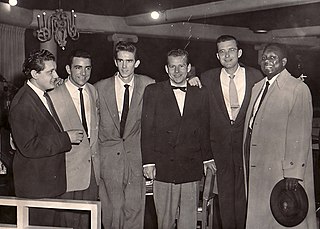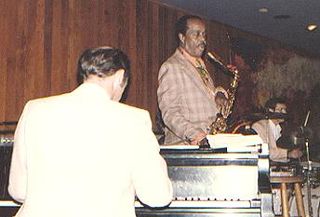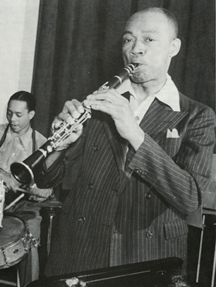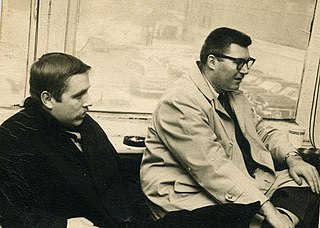Related Research Articles

Robert Edward "Bob" Brookmeyer was an American jazz valve trombonist, pianist, arranger, and composer. Born in Kansas City, Missouri, Brookmeyer first gained widespread public attention as a member of Gerry Mulligan's quartet from 1954 to 1957. He later worked with Jimmy Giuffre, before rejoining Mulligan's Concert Jazz Band. He garnered 8 Grammy Award nominations during his lifetime.

Albert Edwin "Eddie" Condon was an American jazz banjoist, guitarist, and bandleader. A leading figure in Chicago jazz, he also played piano and sang.

Charles Ellsworth "Pee Wee" Russell, was a jazz musician. Early in his career he played clarinet and saxophones, but he eventually focused solely on clarinet.

Harry Howell Carney was a jazz saxophonist and clarinettist who spent over four decades as a member of the Duke Ellington Orchestra. He played a variety of instruments but primarily used the baritone saxophone, being a critical influence on the instrument in jazz.
Elmer Chester Snowden was a banjo player of the jazz age. He also played guitar and, in the early stages of his career, all the reed instruments. He contributed greatly to jazz in its early days as both a player and a bandleader, and is responsible for launching the careers of many top musicians. He has been largely overlooked in jazz history.

Serge Chaloff was an American jazz baritone saxophonist. The first and greatest bebop baritonist, Chaloff has been described as 'the most expressive and openly emotive baritone saxophonist jazz has ever witnessed' with a tone varying 'between a light but almost inaudible whisper to a great sonorous shout with the widest but most incredibly moving of vibratos.'

Donald Johnson Ellis was an American jazz trumpeter, drummer, composer, and bandleader. He is best known for his extensive musical experimentation, particularly in the area of time signatures. Later in his life he worked as a film composer, contributing a score to 1971's The French Connection and 1973's The Seven-Ups.
Reuben "Ruby" Braff was an American jazz trumpeter and cornetist. Jack Teagarden was once asked about him on the Garry Moore television show and described Ruby as "the Ivy League Louis Armstrong".
Benjamin "Buzzy" Drootin was a jazz drummer.

Wilbur Dorsey "Buck" Clayton was an American jazz trumpeter who was a member of Count Basie's orchestra. His principal influence was Louis Armstrong, first hearing the record "Confessin' That I Love You" as he passed by a shop window.

Thomas "Bones" Malone is an American jazz musician, arranger, and producer. As his nickname implies, he specializes on the trombone but he also plays saxophone, trumpet, tuba, flute, and bass guitar. He has been a member of The Blues Brothers, Saturday Night Live Band, and the CBS Orchestra, the house band for the Late Show with David Letterman.

George Holmes "Buddy" Tate was a jazz saxophonist and clarinetist.

Edmond Hall was an American jazz clarinetist and bandleader. Over his long career Hall worked extensively with many top performers as both a sideman and bandleader and is perhaps best known for the 1941 chamber jazz song "Profoundly Blue," which is regarded as a pre-World War II jazz classic.

Benny Morton was a jazz trombonist most associated with the swing genre.

Nathaniel Pierce Blish Jr., known professionally as Nat Pierce was an American jazz pianist and prolific composer and arranger, perhaps best known for being pianist and arranger for the Woody Herman band from 1951 to 1955. Pieces by Pierce were predominantly created for use in big bands.

Joseph Benjamin Wilder was an American jazz trumpeter, bandleader, and composer.

Ernesto Caceres was an American jazz saxophonist born in Rockport, Texas. He was a member of the Glenn Miller Orchestra from 1940–1942.
Herbert Hall was an American jazz clarinetist and alto saxophonist.
Joe Thomas was an American swing jazz trumpeter, who was born in Webster Groves, Missouri, and died in New York City, New York.
Samuel D. Margolis was an American jazz reedist.
References
- Barry Kernfeld, "Al Drootin". The New Grove Dictionary of Jazz . 2nd edition, 2001.